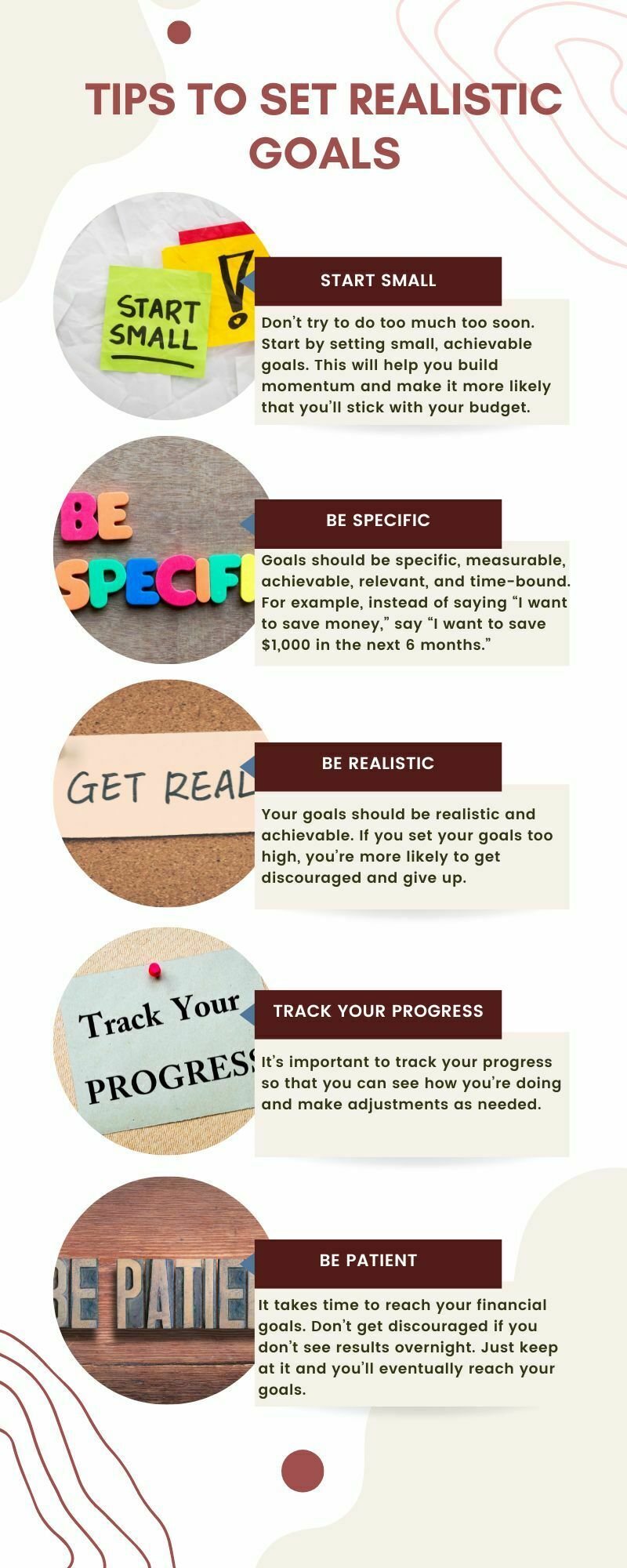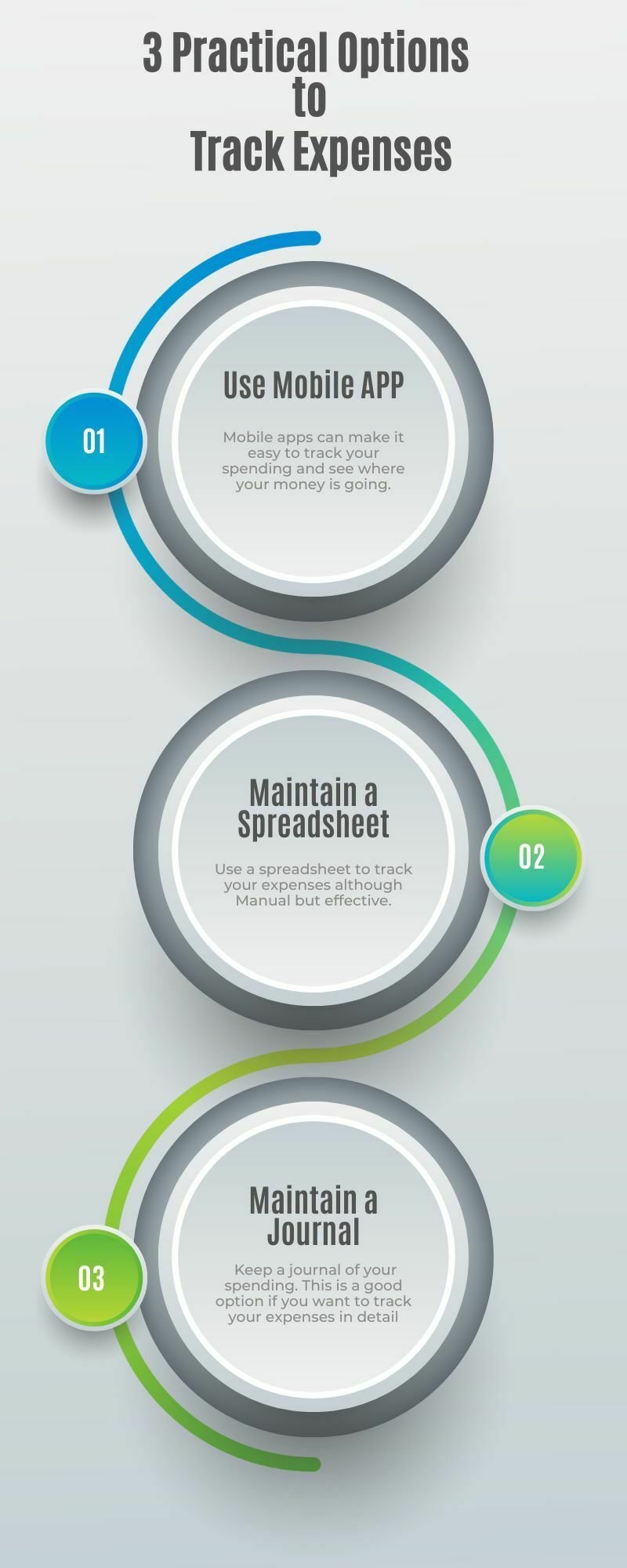
Budgeting is essential for financial stability. Avoiding common budgeting mistakes is equally vital to maximize the benefits of budgeting. Tracking income and expenses helps us understand our financial habits and identify areas to save or invest. In this blog, we will discuss about 7 common budgeting mistakes and tricks to avoid it so that you can set yourself up for financial success. So, let’s delve into the world of budgeting and discover how to sidestep these common pitfalls!
1. Lack of Clear Goals and Planning:
Importance of setting clear financial goals:
Before you can create a budget, it’s important to set clear financial goals. What do you want to achieve with your budget? Are you saving for a down payment on a house? Paying off debt? Building an emergency fund? Once you know what you want to achieve, you can start creating a budget that will help you reach your goals.
Consequences of not having a plan in place:
If you don’t have a plan in place, it’s easy to overspend and not reach your financial goals. When you don’t have a budget, you’re more likely to spend money on things you don’t need. This can lead to debt, financial stress, and even bankruptcy.
Tips for setting realistic and achievable financial goals:

2. Failure to Track Expenses:
What is the Necessity of tracking expenses?
Tracking expenses is essential to understanding your spending habits and making informed financial decisions. When you track your expenses, you can see where your money is going and identify areas where you can cut back. You can also use your expense tracking data to set financial goals and track your progress towards those goals.
Implications of not tracking expenses:
If you don’t track your expenses, you’re more likely to overspend and not reach your financial goals. You may also underestimate your costs, which can lead to financial problems down the road. For example, if you don’t track your spending on eating out, you may not realize how much money you’re actually spending. This could lead to debt or financial stress.
Practical methods for tracking expenses:

In addition to understanding your spending habits, tracking expenses can also help you set financial goals and track your progress towards those goals. For example, if you track your spending on eating out, you may be able to identify areas where you can cut back. However, it’s important to choose a method of tracking expenses that works for you. If you don’t like using a mobile app, you can try using a spreadsheet or keeping a journal.
3. Ignoring Emergency Funds:
Importance of having an emergency fund:
An emergency fund is a savings account that you can use to cover unexpected expenses, such as a car repair, medical bill, or job loss. Having an emergency fund can help you avoid financial crises by giving you a financial cushion to fall back on when unexpected expenses arise.
Mistake of not prioritizing emergency savings in a budget:
One of the most common budgeting mistakes is not prioritizing emergency savings. When you create your budget, it’s important to set aside money each month for your emergency fund. This way, you’ll be prepared for unexpected expenses and won’t have to go into debt to cover them.
Strategies for building and maintaining an emergency fund:
There are many different strategies for building and maintaining an emergency fund. Some popular strategies include:
- Start small: Don’t try to save too much too soon. Start by saving a small amount each month, such as $50 or $100.
- Automate your savings: Set up an automatic transfer from your checking account to your savings account each month. This way, you won’t even have to think about it.
- Use a high-yield savings account: A high-yield savings account will earn you more interest on your money, which will help your emergency fund grow faster.
- Cut back on unnecessary expenses: If you’re struggling to save money for your emergency fund, you may need to cut back on unnecessary expenses. This could mean eating out less, canceling unused subscriptions, or finding cheaper ways to get around.
In addition to having an emergency fund, it’s also important to have a plan for how you’ll use it. For example, if you lose your job, you may need to use your emergency fund to cover your living expenses until you find a new job. However, it’s important to remember that an emergency fund is not a bottomless pit. You should only use it for unexpected expenses.
4. Overestimating Income or Underestimating Expenses:
Potential dangers of overestimating income and relying on unreliable sources:
When you overestimate your income, you’re setting yourself up for disappointment. You may end up spending more money than you have, which can lead to debt. Additionally, if you rely on unreliable sources of income, such as tips or commissions, you may not be able to accurately predict your income each month. This can make it difficult to create a budget that works for you.
Consequences of underestimating expenses and how it can lead to overspending:
Underestimating your expenses is another common budgeting mistake. When you underestimate your expenses, you’re more likely to overspend. This can happen because you’re not accounting for all of your expenses, or because you’re underestimating the cost of certain expenses. Overspending can lead to debt, financial stress, and even bankruptcy.
Tips for accurately estimating income and thoroughly considering all expenses:
To avoid these mistakes, it’s important to accurately estimate your income and thoroughly consider all of your expenses. Here are some tips:
- Track your income and expenses for at least one month before you create your budget. This will give you a good idea of how much money you’re actually bringing in and spending each month.
- Be realistic about your income. Don’t overestimate your income or rely on unreliable sources of income.
- Consider all of your expenses. This includes both fixed expenses, such as rent and car payments, and variable expenses, such as food and entertainment.
- Be prepared to adjust your budget as needed. Your income and expenses may change over time, so it’s important to be prepared to adjust your budget accordingly.
In addition to accurately estimating your income, it’s also important to thoroughly consider all of your expenses. For example, if you underestimate your grocery bill, you may end up overspending on food. However, it’s important to remember that your budget is a living document. It’s okay to adjust it as needed.
5. Failing to Adjust the Budget:
Importance of regularly reviewing and adjusting the budget as circumstances change:
A budget is a living document that should be regularly reviewed and adjusted as circumstances change. This is because your income and expenses can change over time, and you need to make sure that your budget reflects your current financial situation.
Mistake of sticking to a rigid budget without accounting for unexpected expenses or income changes:
If you stick to a rigid budget without accounting for unexpected expenses or income changes, you’re setting yourself up for failure. For example, if you have a car repair that you didn’t budget for, you may have to dip into your savings or go into debt.
How to adapt the budget effectively based on evolving financial situations:
Here are some tips on how to adapt your budget effectively based on evolving financial situations:
- Review your budget regularly: At least once a month, review your budget to see if it’s still accurate. If your income or expenses have changed, you’ll need to adjust your budget accordingly.
- Be prepared for unexpected expenses: Unexpected expenses are a part of life, so it’s important to be prepared for them. You can do this by setting aside an emergency fund or by having a credit card with a low interest rate.
- Be flexible: Things change, so it’s important to be flexible with your budget. If your income decreases, you may need to cut back on your expenses. If your income increases, you may be able to save more money or splurge on something you’ve been wanting.
In addition to regularly reviewing your budget, you should also be prepared for unexpected expenses. For example, if your car breaks down, you’ll need to adjust your budget to account for the repair costs. However, it’s important to remember that you can’t always predict when unexpected expenses will occur.
6. Neglecting Debt Repayment:
Negative impact of neglecting debt repayment in a budget:
Neglecting debt repayment can have a negative impact on your budget in a number of ways. First, it can lead to increased interest charges, which can make your debt even harder to pay off. Second, it can lower your credit score, which can make it more difficult to get approved for loans or credit cards in the future. Third, it can put a strain on your finances, as you’ll have less money available to cover other expenses.
Mistake of not prioritizing debt repayment and its long-term consequences:
Not prioritizing debt repayment is a mistake that can have long-term consequences. If you don’t make regular payments on your debt, you may end up defaulting on your loans, which can damage your credit score even further. This can make it difficult to get approved for loans or credit cards in the future, which can make it harder to build your financial future.
Strategies for managing and reducing debt while maintaining a balanced budget:
- Create a budget that includes a line item for debt repayment. This will help you track your progress and make sure you’re making regular payments on your debt.
- Prioritize your debt repayment. Focus on paying off your highest-interest debt first, as this will save you money in the long run.
- Consider consolidating your debt. This can help you save money on interest and make it easier to manage your payments.
- Look for ways to reduce your expenses. This can free up more money to put towards debt repayment.
- Get help from a financial advisor. If you’re struggling to manage your debt, a financial advisor can help you create a plan and stick to it.
In addition to creating a budget, you can also prioritize your debt repayment and look for ways to reduce your expenses. For example, if you have a credit card with a high-interest rate, you may want to consider consolidating your debt into a loan with a lower interest rate. However, it’s important to remember that there is no one-size-fits-all solution to debt management. The best strategy for you will depend on your individual circumstances.
7. Impulsive Spending and Lifestyle Inflation:
Common mistake of succumbing to impulsive spending and lifestyle inflation:
Impulsive spending is the act of buying something without thinking about it first. This can be caused by a number of factors, such as stress, boredom, or peer pressure. Lifestyle inflation is the gradual increase in your spending habits as your income increases. This can happen because you start to feel like you deserve to spend more money, or because you start to compare your lifestyle to others.
How these habits can hinder budgeting efforts and financial goals:
Impulsive spending can quickly derail your budget. If you’re not careful, you can easily overspend on things you don’t need. Lifestyle inflation can also be a problem, as it can lead to you spending more money than you can afford. This can make it difficult to reach your financial goals, such as saving for a down payment on a house or retirement.
Tips for curbing impulsive spending and avoiding unnecessary lifestyle inflation:
- Plan your purchases in advance: Before you buy anything, take a few minutes to think about whether you really need it. If you’re not sure, wait a day or two before making a decision.
- Set a budget and stick to it: This will help you track your spending and make sure you’re not overspending.
- Avoid shopping when you’re tired, stressed, or bored: These are all times when you’re more likely to make impulse purchases.
- Pay with cash: This will make you more aware of how much money you’re spending.
- Wait 30 days before making a big purchase: This will give you time to think about whether you really want the item and if you can afford it.
- Avoid comparing your lifestyle to others: Everyone’s financial situation is different, so don’t feel like you need to keep up with the Joneses.
In addition to planning your purchases in advance, you can also set a budget and stick to it. For example, if you’re tired, stressed, or bored, you’re more likely to make impulse purchases.
However, it’s important to remember that you can’t completely eliminate impulsive spending. It’s just important to be aware of it and try to curb it as much as possible.
explain Conclusion: Recap the main points discussed in the blog post regarding common budgeting mistakes to avoid. Emphasize the importance of learning from these mistakes to achieve financial success. Encourage readers to implement the suggested strategies and maintain discipline in their budgeting practices. use transition words, shorter sentences, and make short paragraph use
Conclusion:
To summarize, we discussed some of the most common budgeting mistakes to avoid. By learning from these mistakes, you can improve your financial situation and achieve your financial goals.
Key points to remember:
- Set clear financial goals. What do you want to achieve with your budget? Are you saving for a down payment on a house? Paying off debt? Building an emergency fund?
- Track your income and expenses. This will help you understand where your money is going and identify areas where you can cut back.
- Create a budget that is realistic and achievable. Don’t set yourself up for failure by setting unrealistic goals.
- Be prepared to adjust your budget as needed. Your income and expenses may change over time, so it’s important to be flexible with your budget.
- Don’t neglect debt repayment. Making regular payments on your debt will help you save money in the long run and improve your credit score.
- Be patient and disciplined. Budgeting takes time and effort, but it’s worth it in the long run.
I hope this blog post has been helpful. If you’re struggling to create a budget or stick to one, there are many resources available to help you. You can talk to a financial advisor, use a budgeting app, or join a budgeting support group.
The most important thing is to start somewhere. Even if you can only make a small change to your spending habits, it’s a step in the right direction. With time and effort, you can achieve your financial goals and build a strong financial future.
